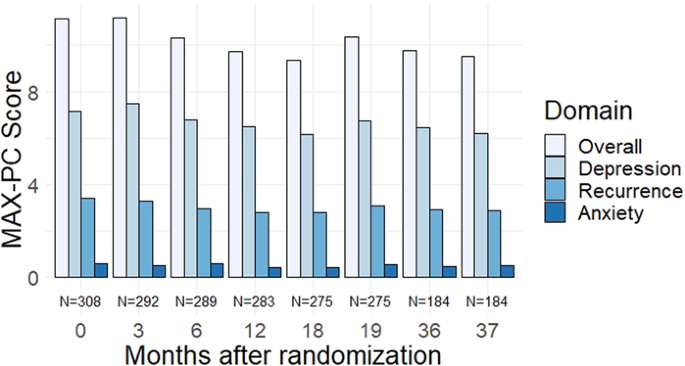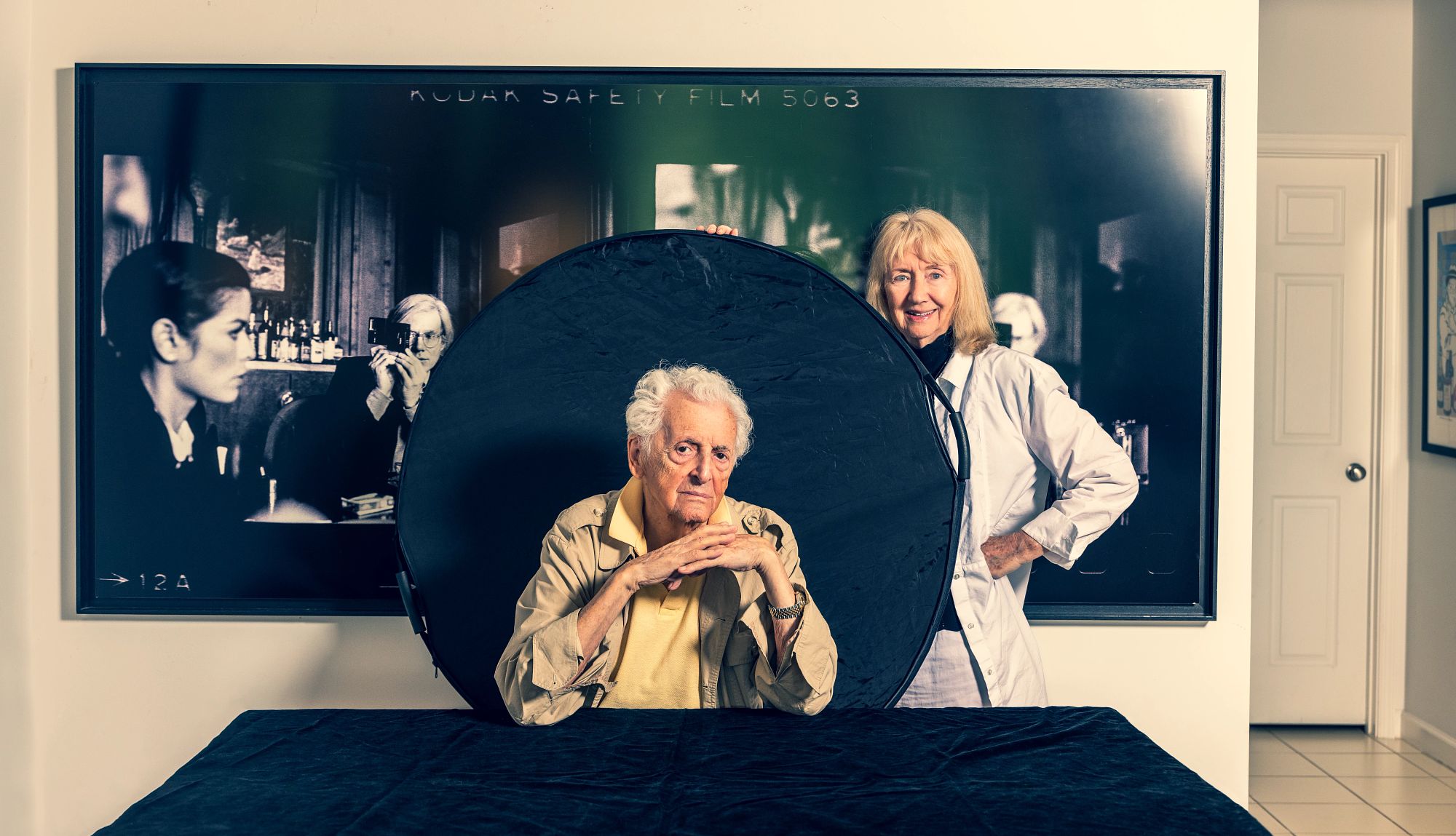
- Select a language for the TTS:
- UK English Female
- UK English Male
- US English Female
- US English Male
- Australian Female
- Australian Male
- Language selected: (auto detect) - EN
Play all audios:
ABSTRACT BACKGROUND Active surveillance (AS) provides appropriate prostate cancer (PCa)-specific survival while minimizing morbidity, but underlying worry of PCa can generate anxiety. The
aim of the study is to evaluate anxiety levels in men on AS and how anxiety relates to disease characteristics and treatment decision-making. METHODS A retrospective analysis was conducted
using all 302 subjects from the Reduction by Dutasteride of clinical progression Events in Expectant Management (REDEEM) study. Prostate biopsies were obtained at 18 and 36 months. Anxiety
was measured at baseline and 3, 6, 12, 18, and 36 months post-randomization using the MAX-PC (Memorial general anxiety scale for PCa) questionnaire. Univariable and multivariable analysis of
the association of disease aggressiveness (PSA levels, percentage of positive cores, and maximum core involvement) and anxiety levels were performed. Cox regression was used to analyze time
to progression to discontinuation of active surveillance as a function of baseline anxiety. RESULTS Overall, MAX-PC scores decreased from moderate at baseline with slight increases after
receiving PSA results at 18 months, followed by more decline. Percentage of positive cores was associated with baseline anxiety (_P_ = 0.02). The association remained when controlling for
age, race, number of cores sampled, body mass index, prostate volume, and maximum core length (_P_ = 0.003). In univariable and multivariable analysis, baseline anxiety was not significantly
associated with time to progression to discontinuation of active surveillance. CONCLUSIONS In evaluating the natural history of anxiety levels among patients with prostate cancer undergoing
active surveillance, there was a decline of anxiety levels over time, with increases after receiving PSA results. Moreover, we found that disease aggressiveness measured by percentage of
positive biopsy cores was associated with baseline levels of anxiety. However, anxiety had no impact on clinical or therapeutic progression. Access through your institution Buy or subscribe
This is a preview of subscription content, access via your institution ACCESS OPTIONS Access through your institution Subscribe to this journal Receive 4 print issues and online access
$259.00 per year only $64.75 per issue Learn more Buy this article * Purchase on SpringerLink * Instant access to full article PDF Buy now Prices may be subject to local taxes which are
calculated during checkout ADDITIONAL ACCESS OPTIONS: * Log in * Learn about institutional subscriptions * Read our FAQs * Contact customer support SIMILAR CONTENT BEING VIEWED BY OTHERS
IMPACT OF ACTIVE SURVEILLANCE FOR PROSTATE CANCER ON THE RISK OF DEPRESSION AND ANXIETY Article Open access 28 July 2022 THE EFFECTIVENESS OF PSYCHOLOGICAL INTERVENTION FOR DEPRESSION,
ANXIETY, AND DISTRESS IN PROSTATE CANCER: A SYSTEMATIC REVIEW OF LITERATURE Article 09 March 2021 COMPARISON OF PROCEDURAL ANXIETY AND PAIN ASSOCIATED WITH CONVENTIONAL TRANSRECTAL
ULTRASOUND PROSTATE BIOPSY TO MAGNETIC RESONANCE IMAGING-ULTRASOUND FUSION-GUIDED BIOPSY: A PROSPECTIVE COHORT TRIAL Article 25 November 2023 CODE AVAILABILITY All computer code used to
generate results is available upon request. REFERENCES * Klotz L, Vesprini D, Sethukavalan P, Jethava V, Zhang L, Jain S, et al. Long-term follow-up of a large active surveillance cohort of
patients with prostate cancer. J Clin Oncol. 2015;33:272–7. Article Google Scholar * Dall’Era MA, Konety BR, Cowan JE, Shinohara K, Stauf F, Cooperberg MR, et al. Active surveillance for
the management of prostate cancer in a contemporary cohort. Cancer. 2008;112:2664–70. Article Google Scholar * van den Berg RCN, Essink-Bot ML, Roobol MJ, Schröder FH, Bangma CH,
Steyerberg EW. Do anxiety and distress increase during active surveillance for low risk prostate cancer? J Urol. 2010;183:1786–91. Article Google Scholar * Marzouk K, Assel M, Ehdaie B,
Vickers A. Long-term cancer specific anxiety in men undergoing active surveillance of prostate cancer: findings from a large prospective cohort. J Urol. 2018;200:1250–5. Article Google
Scholar * Vasarainen H, Lokman U, Ruutu M, Taari K, Rannikko A. Prostate cancer active surveillance and health-related quality of life: results of the Finnish arm of the prospective trial.
BJU Int. 2012;109:1614–9. Article Google Scholar * Chien CH, Chuang CK, Liu KL, Wu CTE, Pang ST, Chang YH. Positive and negative affect and prostate cancer-specific anxiety in Taiwanese
patients and their partners. Eur J Oncol Nurs. 2018;37:1–11. Article Google Scholar * Tavlarides AM, Ames SC, Diehl NN, Joseph RW, Castle EP, Thiel DD, et al. Evaluation of the association
of prostate cancer-specific anxiety with sexual function, depression and cancer aggressiveness in men 1 year following surgical treatment for localized prostate cancer. Psychooncology.
2013;22:1328–35. Article Google Scholar * Ruane-McAteer E, Porter S, O’Sullivan J, Dempster M, Prue G. Investigating the psychological impact of active surveillance or active treatment in
newly diagnosed favorable-risk prostate cancer patients: a 9-month longitudinal study. Psychooncology. 2019;28:1743–52. Article Google Scholar * Watts S, Leydon G, Birch B, Prescott P, Lai
L, Eardley S, et al. Depression and anxiety in prostate cancer: a systematic review and meta-analysis of prevalence rates. BMJ Open. 2014;4:e003901. Article Google Scholar * Tan HJ, Marks
LS, Hoyt MA, Kwan L, Filson CP, Macairan M, et al. The relationship between intolerance of uncertainty and anxiety in men on active surveillance for prostate cancer. J Urol.
2016;195:1724–30. Article Google Scholar * Dale W, Bilir P, Han M, Meltzer D. The role of anxiety in prostate carcinoma: a structured review of the literature. Cancer. 2005;104:467–78.
Article Google Scholar * Fleshner NE, Lucia MS, Egerdie B, Aaron L, Eure G, Nandy I, et al. Dutasteride in localised prostate cancer management: The REDEEM randomised, double-blind,
placebo-controlled trial. Lancet. 2012;379:1103–11. Article CAS Google Scholar * Roth A, Nelson CJ, Rosenfeld B, Warshowski A, O’Shea N, Scher H, et al. Assessing anxiety in men with
prostate cancer: further data on the reliability and validity of the Memorial Anxiety Scale for Prostate Cancer (MAX-PC). Psychosomatics. 2006;47:340–7. Article Google Scholar * Ene KW,
Nordberg G, Johansson FG, Sjöström B. Pain, psychological distress and health-related quality of life at baseline and 3 months after radical prostatectomy. BMC Nurs. 2006;5:8. Article
Google Scholar * Burnet KL, Parker C, Dearnaley D, Brewin CR, Watson M. Does active surveillance for men with localized prostate cancer carry psychological morbidity? BJU Int.
2007;100:540–3. Article Google Scholar * Burgess C, Cornelius V, Love S, Graham J, Richards M, Ramirez A. Depression and anxiety in women with early breast cancer: five year observational
cohort study. Br Med J. 2005;330:702–5. Article Google Scholar * Edwards B, Clarke V. The psychological impact of a cancer diagnosis on families: the influence of family functioning and
patients’ illness characteristics on depression and anxiety. Psychooncology. 2004;13:562–76. Article Google Scholar * Thorsteinsdottir TK, Valdimarsdottir H, Stranne J, Wilderäng U,
Haglind E, Steineck G. Thinking about one’s own death after prostate-cancer diagnosis. Support Care Cancer. 2018;26:1665–73. PubMed Google Scholar * Bill-Axelson A, Garmo H, Nyberg U,
Lambe M, Bratt O, Stattin P, et al. Psychiatric treatment in men with prostate cancer—results from a nation-wide, population-based cohort study from PCBaSe Sweden. Eur J Cancer.
2011;47:2195–201. Article Google Scholar * Dillard AJ, Scherer LD, Ubel PA, Alexander S, Fagerlin A. Anxiety symptoms prior to a prostate cancer diagnosis: associations with knowledge and
openness to treatment. Br J Health Psychol. 2017;22:151–68. Article Google Scholar * Cameron LD, Reeve J. Risk perceptions, worry, and attitudes about genetic testing for breast cancer
susceptibility. Psychol Heal. 2006;21:211–30. Article Google Scholar * Lu D, Andrae B, Valdimarsdóttir U, Sundström K, Fall K, Sparen P, et al. Psychologic distress is associated with
cancer-specific mortality among patients with cervical cancer. Cancer Res. 2019;79:3965–72. Article CAS Google Scholar * Chien CH, Chuang CK, Liu KL, Li CL, Liu HE. Changes in decisional
conflict and decisional regret in patients with localised prostate cancer. J Clin Nurs. 2014;23:1959–69. Article Google Scholar Download references AUTHOR INFORMATION AUTHORS AND
AFFILIATIONS * Department of Urology, University of Illinois College of Medicine, Chicago, IL, USA Ushasi Naha, Michael R. Abern & Daniel M. Moreira * Division of Urology, Department of
Surgery and the Samuel Oschin Comprehensive Cancer Institute, Cedars Sinai Medical Center, Los Angeles, CA, USA Stephen J. Freedland * Urology Section, Veterans Affairs Medical Center,
Durham, NC, USA Stephen J. Freedland Authors * Ushasi Naha View author publications You can also search for this author inPubMed Google Scholar * Stephen J. Freedland View author
publications You can also search for this author inPubMed Google Scholar * Michael R. Abern View author publications You can also search for this author inPubMed Google Scholar * Daniel M.
Moreira View author publications You can also search for this author inPubMed Google Scholar CORRESPONDING AUTHOR Correspondence to Daniel M. Moreira. ETHICS DECLARATIONS CONFLICT OF
INTEREST The authors declare that they have no conflict of interest. ADDITIONAL INFORMATION PUBLISHER’S NOTE Springer Nature remains neutral with regard to jurisdictional claims in published
maps and institutional affiliations. SUPPLEMENTARY INFORMATION SUPPLEMENTAL FIGURE 1 SUPPLEMENTAL FIGURE 2 SUPPLEMENTAL FIGURE 3 SUPPLEMENTAL TABLE 1 SUPPLEMENTAL TABLE 2 SUPPLEMENTARY
FIGURE LEGENDS RIGHTS AND PERMISSIONS Reprints and permissions ABOUT THIS ARTICLE CITE THIS ARTICLE Naha, U., Freedland, S.J., Abern, M.R. _et al._ The association of cancer-specific anxiety
with disease aggressiveness in men on active surveillance of prostate cancer. _Prostate Cancer Prostatic Dis_ 24, 335–340 (2021). https://doi.org/10.1038/s41391-020-00279-z Download
citation * Received: 14 May 2020 * Revised: 13 August 2020 * Accepted: 27 August 2020 * Published: 08 September 2020 * Issue Date: June 2021 * DOI: https://doi.org/10.1038/s41391-020-00279-z
SHARE THIS ARTICLE Anyone you share the following link with will be able to read this content: Get shareable link Sorry, a shareable link is not currently available for this article. Copy
to clipboard Provided by the Springer Nature SharedIt content-sharing initiative



